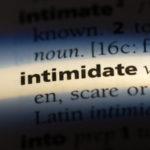Incriminating Yourself On TV, Radio or Social Media

There were shock-waves across America recently when millionaire Robert Durst appeared in a top-rating documentary about his life, including three murders he is accused of committing.
During the final episode of the documentary series The Jinx, Durst – apparently unaware he was still miked up – is filmed in a bathroom whispering to himself, “What the hell did I do? … Killed them all, of course”.
Shortly after this episode went to air, Durst was arrested for the murder of his friend Susan Berman who was found dead in her home in 2000.
There was also suspicion about Durst’s involvement in two other murders, including the suspected murder of his ex-wife, also a friend of Berman’s, who disappeared after saying she wanted a divorce. There is speculation that Berman may have been killed because she knew something about the ex-wife’s disappearance.
After the documentary episode aired, police reopened the investigation into Berman’s death, using Durst’s comments as evidence against him.
This leads to an interesting question: can police in Australia take action against you if you incriminate yourself in a crime on television? Or indeed other types of media? This is a particularly topical question given the rise of social media activities, especially YouTube videos and posting images on other sites such as Facebook.
Surveillance Devices Act
We have written several blogs about the rules that apply to recording people in NSW. Those rules are primarily contained in the Surveillance Devices Act, which sets out when oral and visual recordings can be made and published. It also outlines the limitations to recording and publishing that data, including circumstances when consent is required.
What is interesting in Durst’s case is that he was participating in a documentary, which presumably required his consent. Police were therefore able to treat his comments on camera as having been published and arrest him based upon his apparent admissions.
What exactly is self-incrimination?
Self-incrimination is the comment or action of a person that connects them to a crime. Such comments or actions can become evidence that is used against the person to help prove that they committed a crime.
As explained in previous blogs, the Evidence Act in NSW contains a limited privilege against self-incrimination. It allows a witness to object to answering a question if the answer would tend to incriminate them in another crime. If an objection is raised, the judge may allow the witness not to answer the question, or may require an answer but issue a ‘certificate’ that protects the witness against further proceedings based on the answers that they give.
The protection in the United States is greater than in Australian jurisdictions and is known as the Fifth Amendment to the US Constitution. A witness who invokes the privilege is often said to be “pleading the fifth”.
In recent years, the privilege has been under threat in NSW with the premier proposing to amend the Evidence Act to prevent witnesses from seeking to protect themselves by objecting to questions.
Recent cases in Australia
Although not on the same level of seriousness as murder, recent Australian cases have made it clear that where videos or images have been taken with the consent of the relevant parties and they are of an incriminating nature, criminal charges will be laid by police.
In the first, three teenage girls were charged over an online fight. They had been involved in a number of fights in Sydney which had been recorded and then uploaded to the website YouTube. Police were able to view the videos online to identify the girls, and used the videos to charge the participants.
In a more recent case, a woman in Port Pirie, South Australia, was charged with disorderly behaviour after flashing her breasts at a Google Street View car. Her image was recorded and then uploaded to Google. While there has been lots of social media comment about her actions, 9 News reported that police were less than impressed, with Superintendent Scott Denny saying:
“The woman’s actions were the same as someone flashing their genitals and the public expectation is that we take action.”
The bottom line
Images are documents can be used as evidence to bring charges and potentially convict people of criminal offences, whether they are television footage, photos or videos that are uploaded to social media sites or any other websites.
In certain circumstances, it can be inferred that your actions amount to the consent required for the material to be taken and used. For example, any of the following actions may amount to consent:
- Being interviewed for a television program.
- Being filmed on a reality television show,
- Uploading photos or videos to Facebook or other social media sites.
- Uploading videos of yourself to YouTube.
If any of those images show you participating in a criminal act, then you may be exposing yourself to criminal charges and prosecution. Police can normally use the footage as evidence of your actions, and to incriminate you in the alleged crime.
The bottom line, then, is that you should be very careful about what you film, retain and especially what you publish.
Exercise great care whenever you are creating a recording or image that may be used in any public domain (including private social media pages) and if in doubt, consult a criminal defence lawyer..
Receive all of our articles weekly
Author






